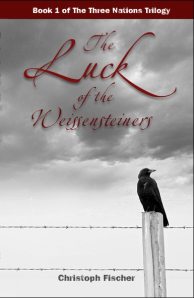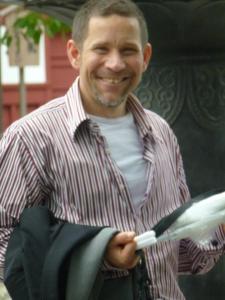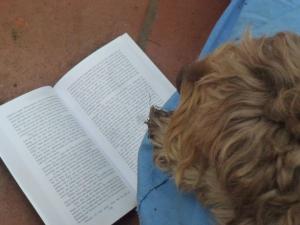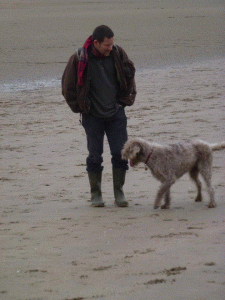Welcome Christoph Fischer, Author of The Luck of the Weissensteiners. I’m thrilled to have you here and ask a few questions from this great read, one of my favorites of 2012.
Below is our interview, my review and some of his readers showing off the book. (Dog lovers don’t miss the photos of his girls)
Your book has a title that implies a lucky family. Why did you choose this in the setting of Nazi Germany?
It was during writing that the title came to me and that was when the theme of ‘luck’ as one of the main issues of the book emerged. In war and in persecution, naked survival is already undoubtedly luck, but it is more complicated than that – as the stories of some of my characters hopefully will show. Under extreme circumstances, such as the Nazi period in Germany, many succumb to their scars, whereas others are lucky enough to survive in their humanity. Only by living through their trials with my characters during the process of writing did these things come clear to me.
What were the seeds of inspiration for you to write this story?
The seed of inspiration was a family anecdote about my grandparents, whose story I initially meant to tell. I never met my grandfather and my grandmother died when I was young. My aunt and my father told me different stories about the family history as well, and so my imagination was free to run wild about their marriage and their lives. I am sorry I cannot say more but I don’t want to give away any of the later plot.
Do you have any personal history or connection with this time and autocrities that went into the story?
My grandparents lived in Czechoslovakia before and during the war as part of the minority group of Germans who gave Hitler the excuse to invade. I know nothing about their political affiliation during that time. My father had to join the Hitler Youth – as every boy had to do – and he only said how scared he was to be punished for mistaking left for right when they had to march. After the war, the family was expelled from the country and spent many months in refugee camps in occupied Germany before finally settling. They lost their homes but fared much better than others in that time.
You started it with a love story but then you took the love story to an interesting place. Without spoiling the story what were your thoughts behind how you presented this.
The story developed naturally in the way it did. When writing the chapters, I sat down without knowing ever exactly what would happen. My imagination of how everyone would react to the events in the book took my characters on their individual paths; they were naughty characters who would not do as I had sometimes intended. I often did not understand their actions and only during the next re-write did their motives become clearer to me. I think I let them develop freely to show that they fell victim to their circumstances and their feelings.
There are a lot of really interesting characters in your story, some courageous and some evil and cowardly. Who do you relate with the most and why?
That is very difficult to answer. Whilst writing, at some point I identified with almost all of them and many lines in their dialogue would come straight from my own mouth. I would like to be like Jonah, Greta’s lovely and witty father; have some qualities of the generous Countess, a patron of the arts; or the selfless Alma, the help in the weaving business. On the other hand, I can be as moody as the Dutch painter Visser and even as self-involved as the wicked but ambiguous farmer’s wife Johanna.
What was the most shocking thing you learned while researching your book? How did you incorporate that into your story?
Fortunately nothing new that I learnt during my research was as shocking as the horror stories we already know about the holocaust. That aside, I was surprised to find many details and individual stories of suffering on a different scale. I was lost for choice which ones to choose and to incorporate and so I let ‘luck’ choose for me. Army movements, local uprisings and the timing of political measures could change lives overnight. Just as I had ‘saved’ my characters in one chapter, the next page brought new challenges.
Is there a question about your book you would love to be asked? If so, what is it?
Yes, the question is: Why are you writing a story about Jews when you are a descendant of Sudeten Germans who have lost all their land and possessions after the war?
What’s the answer?
My heart certainly goes out to the poor innocent citizens who were drawn into Hitler’s vicious politics and had nothing to do with him; I grieve for their loss of home and sense of belonging, for the injustices that they had to suffer.
But the story of that War belongs to the victims: Jews, Communists, Gypsies, homosexuals and so on. I could not bring myself to take the main focus at least away from that group. They are there but in minor roles.
In Germany, there are still groups of descendants of these expelled Germans who lobby for retribution and a return of their former properties. My father publicly distanced himself from these people and taught me to look forward and not to try to waste my time trying to reverse history and reconstruct a past that is gone.
What would you like to say to your readers?
Thank you for taking the time to read this interview and the works of independent authors. Without the publicity of established Publishers, we rely on your support and appreciate it very much.
(From Paulette: Those were great answers and it helps to broaden the dept of all that you put into writing this very remarkable story. Thank you so much!)
My Review: 5*
Christoph Fischer’s The Luck of the Weissensteiners , was an epic and impressive read. The amount of research the author must have put into writing this story was evident by the well thought out and described times in time when geography was redirected by reigns of terror in Germany, in Russia, in the hearts of others that could watch nations of peoples, families torn apart and displaced. What starts out as a love story, a metaphor beginning in the spring of a young couple lives moves into the dark themes of our human shadow, where love turns to distrust and betrayal.
This is a story of intolerance at its worst, but is also a story of the strength of the human spirit to help and do good at great risk. While parts were too overly narrative for my taste the story and oppression of the time were never lost on the read, which kept me involved in this story, that by the time I was half way into the story I wanted to take time off to sit and finish it, to find out what happened to all the characters in their struggle to escape and survive. Sadly, like all of life there is much sorrow and loss, reality, but there is also survival and hope. I will not forget this read for a while to come.
Links: (provide all your links here – anything you want me to post)
Amazon US:
Amazon UK:
Goodreads: http://www.goodreads.com/author/show/6590171.Christoph_Fischer
Website:
http://www.christophfischerbooks.com/
Blog:
http://writerchristophfischer.wordpress.com/
Facebook:
http://www.facebook.com/TheLuckOfTheWeissensteiners?ref=hl






Looks like a great read. Going to check it out.
It was a great read. Glad you’re going to have a look. 🙂
Great interview, and I loved the dogs!
Thanks, Deb. Me too, I’ve adopted that whole family. 🙂
Heading over to check out his blog. At this rate of adding books to my book list I have to live to 178 to read them all. 🙂
Boy do I hear you on the list of books. There are just too many. What I have vowed to do is read & review as many indie authors this year as I can to try to help them out. Christoph has a great blog and does a lot to highlight other authors. He also has a blog that he set up for his dogs, one of which is about to give birth any day. I’m following that one minute to minute cause he said he’s going to name one of the girls Mildred, lol. 🙂
I think Mildred would be honored! 🙂
Yes, that she would be.
I think it is wonderful, your generous spirit with other authors. 🙂
Oh Colleen, thank you so much but I’ve been blessed with so much support and help with mine and want to give back to help others as I can. That goes for you if you ever put your excellent writing into a book and I mean that most sincerely. Paulette
Reblogged this on writerchristophfischer and commented:
A great honour for me today. Paulette Mahurin, the award sweeping author of The Persecution of Mildred Dunlap, has featured me on her own blog. Thank you Paulette for your generous support. Coming from a writer like yourself it means a lot. Christoph Fischer
The honor is mine and it’s a pleasure for me to feature your great book here. 🙂
Thank You Paulette, what a great honour. You may be pleased to hear that Wilma is to have her litter and our own little Mildred in form of a labradoodle. x
That is such a thrill and I’m beside myself with joy that you’ve named your first puppy Mildred. I just saw little Mildred’s photo. She’s an adorable chocolate. What an exciting day this is for you. 🙂
Pingback: Interviewed by Paulette Mahurin | Christoph Fischer Books
Chris is quite an intelligent man! And what a beautiful review, Paulette. You always put the best on the table. Now I have to add his book too. Have a wonderful week ahead.
Uzoma! So great to see you here. Christoph is a wonderful extremely supportive author and friend. So glad you’ve connected with him, two intelligent talented writers. 🙂
Oh, and I love his dogs too. They’re cute!
Wilma, is having puppies as we speak. He named the first one Mildred to honor the main character in my book. She’s a chocolate labradoodle. The second is Noah, another chocolate. He’s posting them right now and we’re all gawking at how precious they are. 🙂
This sounds like a compelling story and one not dissimilar to one I’m about to write. This portion of an answer to one of the questions you asked Chris was simply enchanting to me: “…they were naughty characters who would not do as I had sometimes intended. I often did not understand their actions and only during the next re-write did their motives become clearer to me. I think I let them develop freely to show that they fell victim to their circumstances and their feelings.” Wow, it must be las if he was living with the characters he created…
Yes, it does. It happens. I know from writing Mildred also and I’ve written about the process of stepping out of the way of the characters, the story writing itself. It’s a fascinating zone to be in especially when the theme/scenes are in such an evil backdrop. Can’t wait to have a read at what you’re about to write when it’s ready. Keep us posted.
Will do!
I love the pictures of the dogs! I enjoyed the interview as well – it’s fascinating to hear about an author’s thoughts and how a book came about. The book sounds very interesting.
It is fascinating, Clowie. I love the dog’s photos also. I do gravitate to dog friends. Wilma, one of the dogs, had her litter of puppies today. He named the first born, a girl, Mildred. So sweet and what an honor.
That’s lovely!
🙂 Just reblogged photos of the puppies. Sooooo cute, Clowie. 🙂
Sounds like a great read!
Love the pics.
I knew you’d love the pics, Tara’s mommie. The book was a terrific read. 😉
The puppies were gorgeous, too esp., Mildred! 🙂 Ela
🙂
Another pic for Auntie Paw-wet! 🙂 http://poet4justicedotwordpressdotcom.wordpress.com/2013/02/27/hold-on/
Oh that is such a cute photo. I don’t know how I missed that one today. Thanks!! 🙂
Sorry but I put it up esp. for you after I saw your ‘like’! 🙂
I must have fast forwarded right by it. That happens sometimes when I’m scrolling down. So glad you grabbed my attention back. My apologies. 🙂
No, I put it up esp. for you AFTER I saw your ‘like’ , i.e. AFTER your first visit!
Sorry for the confusion. 😦
Thanks for explaining. But sometimes my computer does jump or scan down. It has a mind of its own, lol. I’m glad you alerted me back to her photo and that’s so sweet you put it up for me. Doggie love! 🙂
😀
Tara says ‘Hi, Auntie Paw’, wag-wag! :http://elanathevoiceofthefuture.wordpress.com/2013/03/01/bad-karma/
Another book for my sister. Sorry Paulette I am a slow reader. I let my sister read first. 😀
Understand. Give your sister my best. 🙂
Wonderful interview!
So glad you liked it. He’s a wonderful author and man.
Nice photographs.
They are of this talented author and his dogs. Always love looking at photos of my friend’s fury family. Thank you for the comment. 🙂
This is lovely
Ah, thank you Lou. ❤